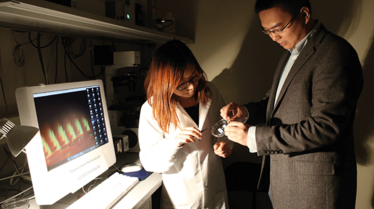Bio-Responsive Insulin Delivery
A “smart” synthetic patch uses live pancreatic cells to painlessly deliver insulin through microneedles – on demand

Frequently injecting insulin to respond to rises in blood-sugar levels can be both painful and inconvenient. But given that replacing dysfunctional beta cells with healthy donor cells has a number of rejection risks, injections are often seen as the lesser of two evils. Is there a better alternative? Yanqi Ye, PhD research assistant at the University of North Carolina at Chapel Hill, US, and her colleagues have developed a synthetic patch, filled with natural beta cells, that can secrete doses of insulin to control blood sugar levels on demand.
The patch is based on a microneedle platform. “The cells naturally secrete insulin on the patch while the needles act as a bridge between the physiological signals within the body and the therapeutic cells outside the body to keep glucose levels under control,” says Ye, principal author of the study (1). In simple terms, when glucose levels in the blood rise, the beta cells secrete insulin, which is delivered through the microneedle patch. But how do the beta cells sense the rise?
In an earlier stage of the work, the researchers only integrated cells with the patch – hoping that, under a hyperglycemic state, glucose could diffuse through the needle and interact with beta cells to promote insulin secretion. However, due to the limited diffusion of glucose, the patch did not effectively respond, and an insignificant increase in insulin secretion was detected. Ye and the team met the challenge: “We have created ‘glucose-signal amplifiers,’ which are synthetic vesicles filled with three components to make sure the beta cells can ‘hear’ the call from rising blood-sugar levels and respond accordingly.”
The patch has been tested in mice models of type-1 diabetes and was able to help lower blood sugar levels for 10 hours at a time. In the future, Ye believes the therapy could be personalized by using beta cells derived from the patients themselves.
The group has also been investigating the potential of the bio-responsive microneedle delivery platform to treat different diseases. “In our latest study, we applied a microneedle patch loaded with anti-PD1 antibody (a cancer immunotherapeutic drug) for treating melanoma,” says Ye. “We have other ongoing projects too.”
- Y. Ye et al, “Microneedles Integrated with Pancreatic Cells and Synthetic Glucose-Signal Amplifiers for Smart Insulin Delivery,” Adv. Mater (Epub ahead of print, 2016). PMID: 26928976.

Over the course of my Biomedical Sciences degree it dawned on me that my goal of becoming a scientist didn’t quite mesh with my lack of affinity for lab work. Thinking on my decision to pursue biology rather than English at age 15 – despite an aptitude for the latter – I realized that science writing was a way to combine what I loved with what I was good at.
From there I set out to gather as much freelancing experience as I could, spending 2 years developing scientific content for International Innovation, before completing an MSc in Science Communication. After gaining invaluable experience in supporting the communications efforts of CERN and IN-PART, I joined Texere – where I am focused on producing consistently engaging, cutting-edge and innovative content for our specialist audiences around the world.



















